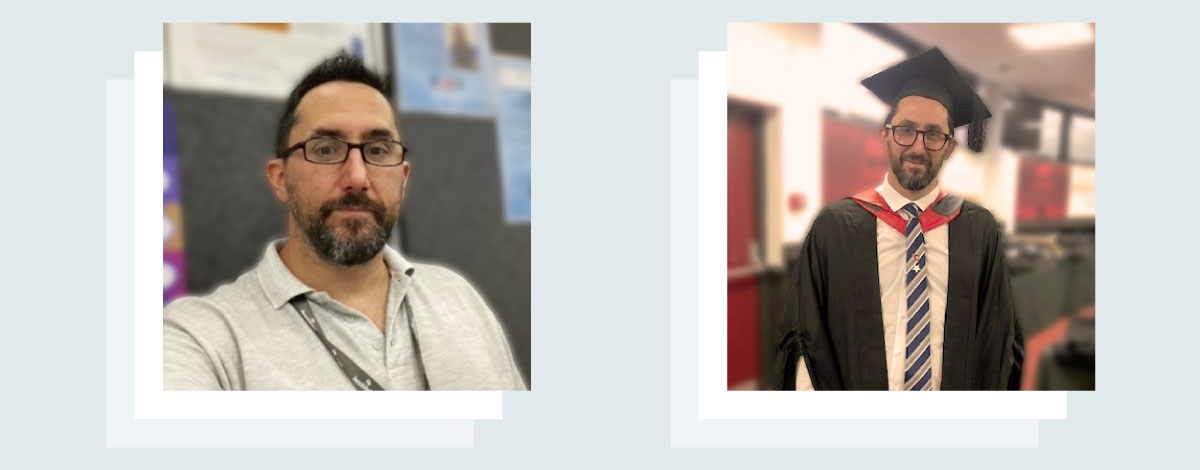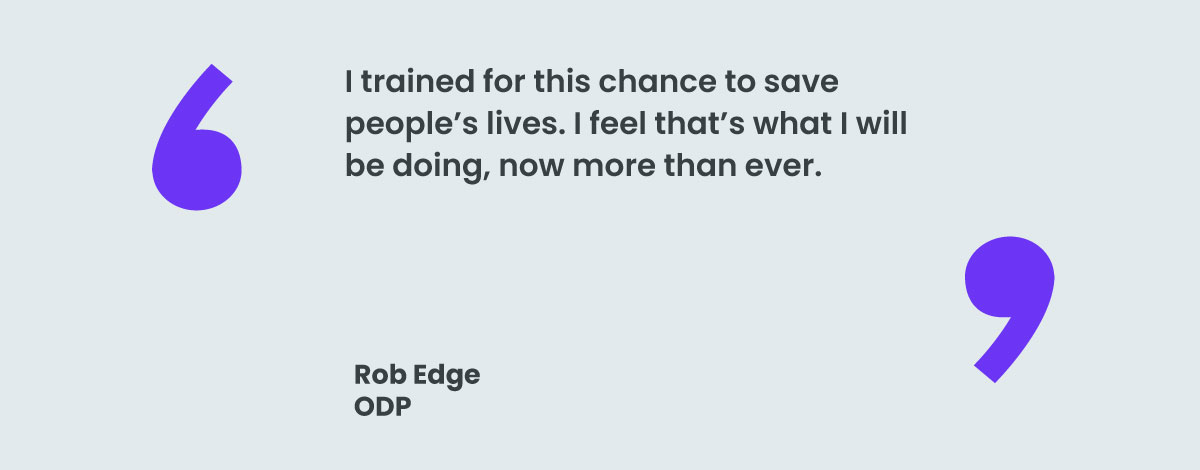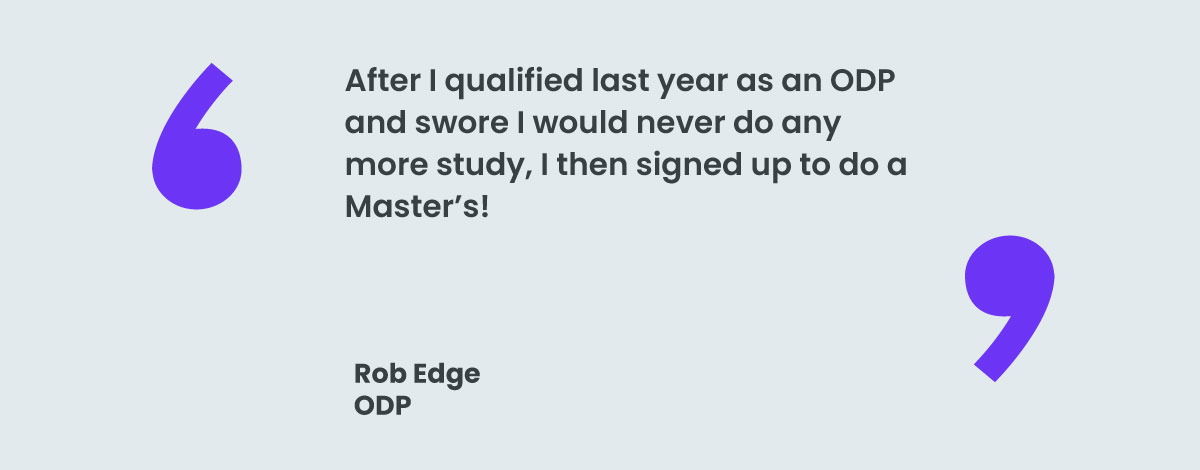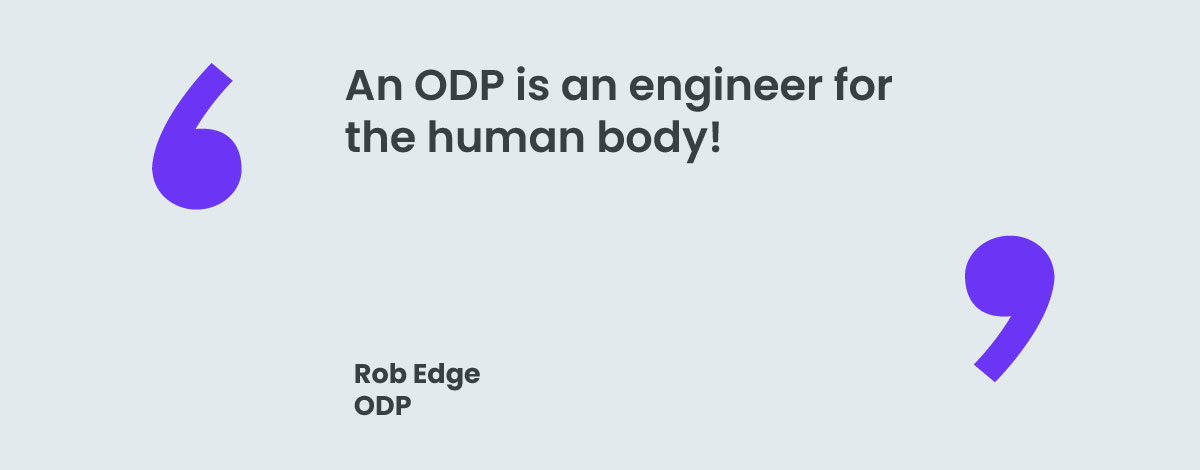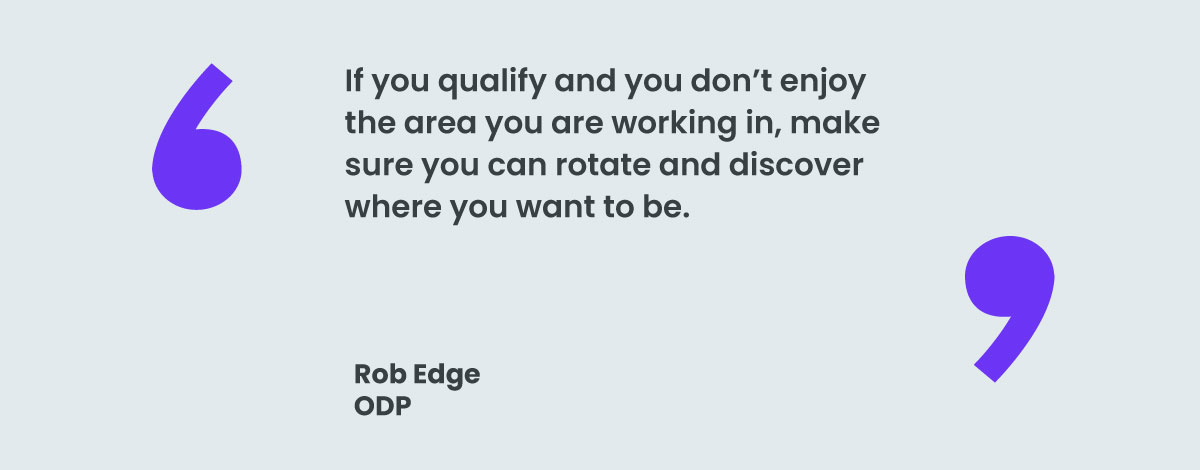Reflections with Julia: “I trained for this chance to save people’s lives. I feel that’s what I will be doing, now more than ever.”
07 Dec 2022Interview
Last year, we spoke to Rob Edge who, at the time, was in his third year of studying to become an Operating Department Practitioner. Keen to know how things worked out, we caught up with Rob again to find out how his career’s been going since graduating.
Julia: Thanks for joining us again, Rob. Firstly, can you share a potted history of what you've been up to since graduating?
Rob: “I graduated last September, 2021, and started working as an ODP at the Princess Royal Hospital in Telford and also in a role in the Workforce Development Department, where we would look at ways to increase awareness of not just the ODP role but all AHP roles within the trust, getting more people into the workforce.
“I’ve since moved to a new role in the National Organ Retrieval Service (NORS) as a Perioperative Practitioner at the Oxford University Hospitals NHS Foundation Trust.”
What made you switch to your current role?
“I saw the role advertised on NHS Jobs and went for it. Although I have not long qualified, I wanted to apply to get my name on their radar. I never thought I stood a chance of actually getting it, but they seemed to love me at the interview and thought I was so passionate about it that they offered me the job. At that point, I hadn’t even been qualified for a year, so it was a big step and I moved up a pay band too. Plus I will get to travel around Europe and the Commonwealth - we had a retrieval from a donor in Ireland recently.
“I’m still an ODP, but now working as a NORS POP. In this role, I scrub in with the surgeon to retrieve organs from someone who has lost their life but is kindly donating their organs to save someone else’s. It is very respectful, and we hold a silence first, a reflective moment to thank the patient. I feel this is what I trained for: I trained for this chance to save people’s lives. I feel that’s what I will be doing, now more than ever.
“We perfuse the organs with fluids so they are suitable for transport, and some go off for lab tests and research. We have to make sure they are packed securely, safely, and treated with respect. Eventually, as part of this role, I will learn to assist in the transplantation to the recipient, which could be in another 12-18 months.
“My base is Oxford, where I work for three days. So I travel down, do an office day, and then spend 48 hours on call.
“Our donor hospitals have specialist nurses who have the conversations with the relatives and bring up the difficult subject of organ donation. When a family agrees to a donation, we get mobilised. From that point, we have 90 minutes to arrange equipment and get ready for transport, and an ambulance takes us there. There’s a lot involved to make sure a patient is a compatible donor.
“I love the role already and feel part of the team. Because I am so recently qualified, I am pretty malleable; they give me the information and I can take it in.”
Has working as a fully qualified ODP lived up to your expectations so far?
“It’s been a learning curve and there are still moments where you have imposter syndrome. Every team I have worked with have been supportive. You are always with someone who is qualified until you are signed off and ready. This is your supernumerary period.
“Since July when I was offered the job, I was in close contact with the team. I asked for information on what I could research, like policies, protocols, and YouTube videos on some of the new equipment. I was pretty well established in my last role, so taking on this new position has been the biggest learning curve.
“After I qualified last year as an ODP and swore I would never do any more study, I then signed up to do a Master’s! It’s quite left-field; a research Master’s in nursing, midwifery and AHP mental health and wellbeing. I did my dissertation for undergrad on a similar subject and it came to light there was a lack of research in the area, so I was concerned for future staff and students.”
In our last interview, it was clear you were really passionate about the ODP role becoming more prominent in people’s minds when considering a career in the NHS. Do you think things have shifted at all? Is the role becoming more well-known?
“I think it is, yes, and sadly COVID helped. As ODPs, we became an essential workforce in ITU and other areas. The way we are trained means we can be deployed to other areas including A&E and resus. The ODP in theatres will be on call and often called out to other departments. We are very specialist in our area.
“As part of my role in the Workforce Development team, I started to go to school careers fairs and give talks in schools. We need to get people thinking about the role before they choose their options. If we wait too long, they may have already made up their minds and they might want to be an engineer, for example. But an ODP is an engineer for the human body!
“Once students learn what we do, they are really inquisitive. I’ve always been proactive in promoting ODPs on Twitter and Instagram, but I and other team members now see the power of sharing it with young people.”
Are you still finding time for your CPD?
“With the NORS, I remain a registered ODP so I have the same CPD requirements. A lot of the CPD I have been doing recently is around organ donation. Before that, I was interested in maternity, so I did a lot of learning around postpartum haemorrhage and C-Sections.
“The good thing with my new job is that I have an office day, so I can take some time to update my CPD records and see what else is available.”
What CPD activities have your enjoyed most recently?
“I like the CPD training where I can sit in a classroom and use the equipment. I enjoyed the blood gas analyser training, where we learned how to use the machinery needed to sample the blood.
“I like to see how the machinery works, as I am a kinesthetic learner. I like to learn by doing, holding, touching, and feeling. That was actually one of the joys of the ODP qualification: 90% of the learning was in the hospital.
“There is a lot of CPD out there if you are willing to look for it. Hospitals offer plenty of in-house training, but it tends to be specific to the equipment they use.
“There is a website I often used when I was in my first role: perioperativecpd.com. The website gives you an example case study and then you have a mini-exam to test your knowledge. If you pass, you get a certificate.
“I do like to receive a certificate from the CPD I do, so I can look back on what I have studied and see how much I remember in, say, a year’s time. Or maybe go back and do the course again.
“We do have to do ILS and paediatric ILS on a yearly basis, as well as CPR training annually. Many Trusts have big e-learning networks, for example where you can take canulation e-learning.”
What CPD resources can you recommend - and what areas are you lacking resources in?
“The one area I have always struggled to find CPD for is understanding the equipment trays used during surgery. Unless you have used it. you don’t know it exists: retractors, blade handles, needle holders. There are so many different ones with that you won’t see them all in your career. There is no resource that gives you a comprehensive list of surgical equipment. Unless you go to the manufacturer and go through their catalogue of equipment! Each hospital can use different types of equipment or call it a different name.
“If you change where you are working, you will come across equipment you have not used since your training. It can be very stressful when under pressure!
“At Telford, if they had a quiet day, they would take a clean tray and talk you through the equipment they use to help with this.”
By the end of next year, you will be eligible to be picked for an HCPC audit. Are you dreading it, or will it be a piece of cake?
“I dread it because everyone dreads it. But I’m confident I have done enough CPD to fulfil my training needs. It is the putting together of the information that’s the challenging part.”
Do you have any advice for the student ODPs out there, who’ll be graduating next year? What can they do to prepare themselves for life after studenthood?
““Research what you want to do next. Don’t be afraid to ask questions and still seek out advice, especially during your supernumerary period. No one will judge you. You have learnt so much, your brain is fried. It is a career, so if you can’t enjoy it and learn about it, you need to find out why.
“For me, I hated orthopaedics and had no interest in it. I was interested in maternity, head and neck, and general surgery, so that is where I was deployed most. If you qualify and you don’t enjoy the area you are working in, make sure you can rotate and discover where you want to be.”
A huge thank you to Rob for taking the time to reflect with us on his experiences since graduation. If you enjoyed this article and found it to be a valuable insight into the life of an ODP, please share it on Twitter.
Julia helps you record, reflect, and report on your CPD through our website and app.
It's an easy way for you to stay on top of your CPD. Sign up for a 14 day free today.
